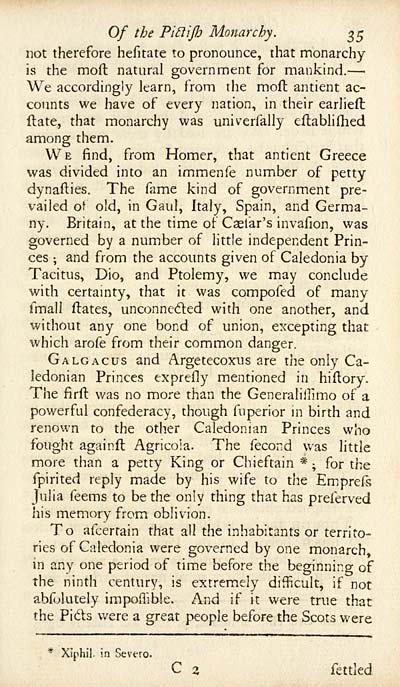Blair Collection > Critical dissertations on the origin, antiquities, language, government, manners, and religion, of the antient Caledonians, their posterity the Picts, and the British and Irish Scots
(73)
Download files
Complete book:
Individual page:
Thumbnail gallery: Grid view | List view

Of the Piaijh Monarchy. ^^
not therefore hefitate to pronounce, rhat monarchy
is the mofl natural government for mankind. —
We accordingly learn, from the mofl antient ac-
counts we have of every nation, in their earlieft
(late, that monarchy was univerfally eflablifhed
among them.
We find, from Homer, that antient Greece
was divided into an immenfe number of petty
dynafties. The fame kind of government pre-
vailed ot old, in Gaul, Italy, Spain, and Germa-
ny. Britain, at the time of Caelar's invafion, was
governed by a number of little independent Prin-
ces ; and from the accounts given of Caledonia by
Tacitus, Dio, and Ptolemy, we may conclude
with certainty, that it was compofed of many
fmall ftates, unconnected with one another, and
without any one bond of union, excepting that
which arofe from their common danger.
Galgacus and Argetecoxus are the only Ca-
ledonian Princes exprefly mentioned in hiftory.
The firft was no more than the GeneralilTimo of a
powerful confederacy, though fuperior m birth and
renown to the other Caledonian Princes who
fought againft Agricoia. The fecond was little
more than a petty King or Chieftain *; for the
fpirited reply made by his wife to the Emprefs
Julia feems to be the only thing that has preferved
his memory from oblivion.
To afcerrain that all the inhabitants or territo-
ries of Caledonia were governed by one monarch,
in any one period of time before the beginning of
the ninth century, is extremely difficult, if not
abfjlutely impoffible. And if it were true that
the Pidls v/ere a great people before the Scots were
Xiphil. in Sevtro.
C z fettled
not therefore hefitate to pronounce, rhat monarchy
is the mofl natural government for mankind. —
We accordingly learn, from the mofl antient ac-
counts we have of every nation, in their earlieft
(late, that monarchy was univerfally eflablifhed
among them.
We find, from Homer, that antient Greece
was divided into an immenfe number of petty
dynafties. The fame kind of government pre-
vailed ot old, in Gaul, Italy, Spain, and Germa-
ny. Britain, at the time of Caelar's invafion, was
governed by a number of little independent Prin-
ces ; and from the accounts given of Caledonia by
Tacitus, Dio, and Ptolemy, we may conclude
with certainty, that it was compofed of many
fmall ftates, unconnected with one another, and
without any one bond of union, excepting that
which arofe from their common danger.
Galgacus and Argetecoxus are the only Ca-
ledonian Princes exprefly mentioned in hiftory.
The firft was no more than the GeneralilTimo of a
powerful confederacy, though fuperior m birth and
renown to the other Caledonian Princes who
fought againft Agricoia. The fecond was little
more than a petty King or Chieftain *; for the
fpirited reply made by his wife to the Emprefs
Julia feems to be the only thing that has preferved
his memory from oblivion.
To afcerrain that all the inhabitants or territo-
ries of Caledonia were governed by one monarch,
in any one period of time before the beginning of
the ninth century, is extremely difficult, if not
abfjlutely impoffible. And if it were true that
the Pidls v/ere a great people before the Scots were
Xiphil. in Sevtro.
C z fettled
Set display mode to: Large image | Transcription
Images and transcriptions on this page, including medium image downloads, may be used under the Creative Commons Attribution 4.0 International Licence unless otherwise stated. ![]()
| Permanent URL | https://digital.nls.uk/76287414 |
|---|
| Description | A selection of books from a collection of more than 500 titles, mostly on religious and literary topics. Also includes some material dealing with other Celtic languages and societies. Collection created towards the end of the 19th century by Lady Evelyn Stewart Murray. |
|---|
| Description | Selected items from five 'Special and Named Printed Collections'. Includes books in Gaelic and other Celtic languages, works about the Gaels, their languages, literature, culture and history. |
|---|

